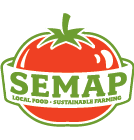I took a bit of an early summer hiatus from Vine Articles as our family celebrated the arrival of our 3rd child, Walter back in early May… and while life hasn’t quite slowed down I wanted to take a moment to share some “in-season” practical advice… if you have a topic which you would like to read about in an upcoming Vine please let me know.
Soil Testing in Late Summer
If you are anything like us, adding another item to the to-do list in August may seem absurd, but that’s what we are doing at Brix Bounty this August. Amidst the hustle of the harvest and the bountiful glory of cherry tomato season, we’ll sneak a moment to pull soil samples and send them off to the lab so that we have current information as we make important fall fertility decisions. For some growers, cash flow may limit fertility improvements beyond cover crop seed for the early fall, however if you are considering fall lime applications or adding other amendments ahead of winter cover, now is a great time to test your fields before spending money on additional inputs. While less common in our region, a number of growers have adopted a fall mineralization program to help restore fertility ahead of the next growing season. Lancaster Ag in Pennsylvania has fall blends which are suitable for organic production and may be considered, or you can work with your local dealer to develop a blend which is targeted for your situation. On our farm we’ll be looking at our calcium/magnesium levels & balance to determine if we want to add lime or gypsum ahead of sowing cover crops and the expected late fall/wintertime precipitation. On our fields which are high in Magnesium we are considering a field broadcast of Solucal-S to help bring down our Mg levels (from Progressive Grower in Wareham – important note Solucal-S isn’t certified organic though they do use a mined gypsum as a base for this product and I reckon it would be OMRI compliant if they were to do all the paperwork…). Stick with the soil lab which you are familiar with… for most folks that will be the UMass Soil & Tissue Testing Lab which uses a Modified Morgan Extract which has been a good track record for soils in Southeastern Massachusetts. We’ve also used Logan Labs in Ohio which uses a stronger Mehlich-3 extraction; analysis we find useful as we address trace mineral deficiencies on our farm (though it should be noted that we don’t recommend relying on a Mehlich 3 extraction for determining Phosphorous applications).
We’ve got a stellar example of the role fertility plays in healthy crop production on our farm as we speak… as our early crop of cherry tomatoes struggles to fully thrive, they are on low potassium soils in a non-irrigated setting and in Year 1 of our fertility protocol. Meanwhile our main crop of cherry tomatoes, on soils which we’ve been amending for the past 5 years (also non-irrigated), are growing like crazy and producing a nice early fruit set which weathered this Monday’s quick downpour rather well – not too many splits. Sun Peach which we grew for the first time last season is making a solid case for a permanent place in our planting rotation (we’ll share a picture next month) judged by the flavor, size, and quantity of fruit early on… we’ll see how it holds up through the season.
Hope the summer’s harvest are bountiful and the customers plentiful… and looking forward to see folks out & about in August – at the Bristol County Farm Bureau summer picnic at Chamberlain Farm on Sunday afternoon August 23rd. -Derek Christianson
